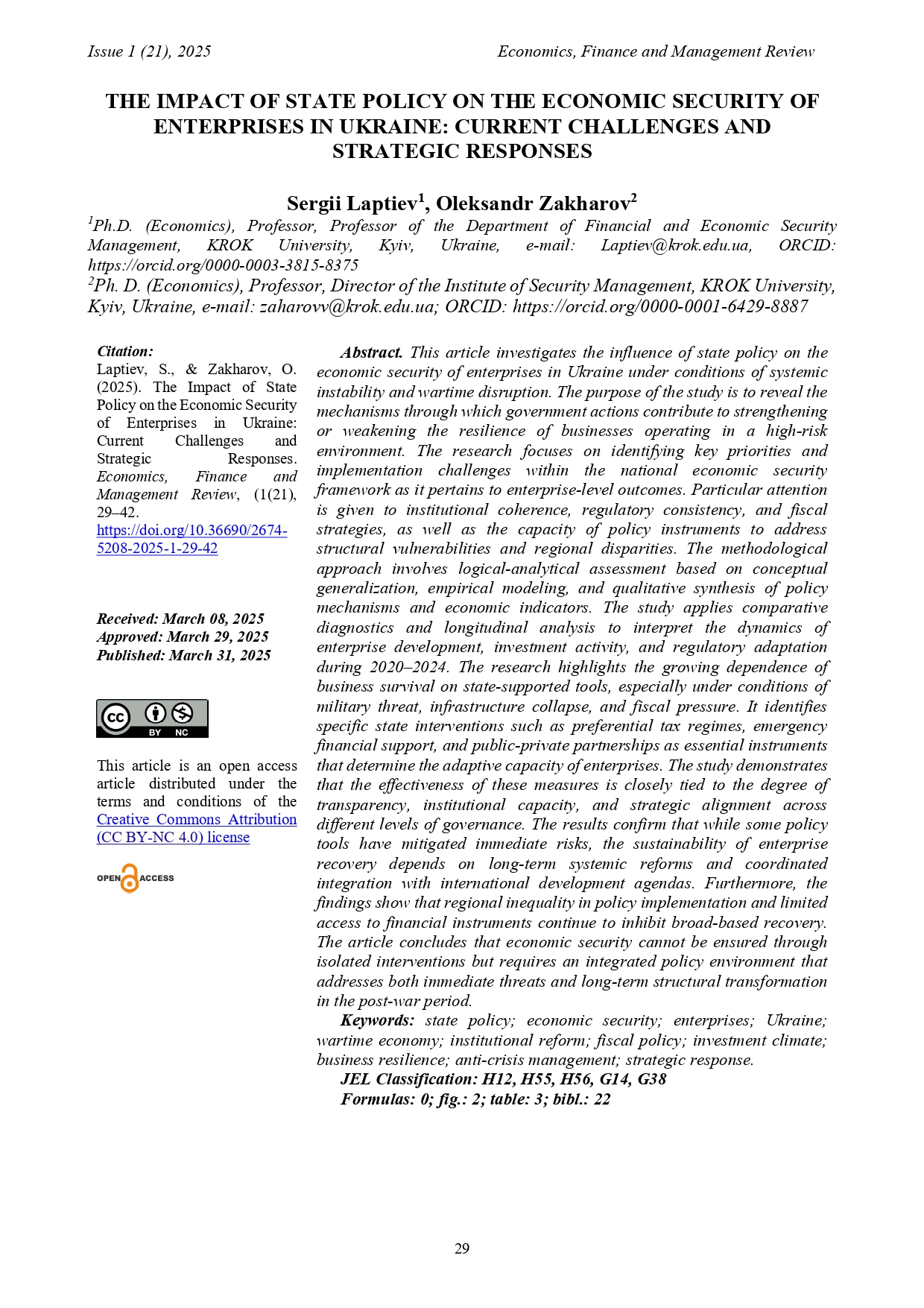THE IMPACT OF STATE POLICY ON THE ECONOMIC SECURITY OF ENTERPRISES IN UKRAINE: CURRENT CHALLENGES AND STRATEGIC RESPONSES
DOI:
https://doi.org/10.36690/2674-5208-2025-1-29-42Keywords:
state policy, economic security, enterprises, Ukraine, wartime economy, institutional reform, fiscal policy, investment climate, business resilience, anti-crisis management, strategic responseAbstract
This article investigates the influence of state policy on the economic security of enterprises in Ukraine under conditions of systemic instability and wartime disruption. The purpose of the study is to reveal the mechanisms through which government actions contribute to strengthening or weakening the resilience of businesses operating in a high-risk environment. The research focuses on identifying key priorities and implementation challenges within the national economic security framework as it pertains to enterprise-level outcomes. Particular attention is given to institutional coherence, regulatory consistency, and fiscal strategies, as well as the capacity of policy instruments to address structural vulnerabilities and regional disparities. The methodological approach involves logical-analytical assessment based on conceptual generalization, empirical modeling, and qualitative synthesis of policy mechanisms and economic indicators. The study applies comparative diagnostics and longitudinal analysis to interpret the dynamics of enterprise development, investment activity, and regulatory adaptation during 2020–2024. The research highlights the growing dependence of business survival on state-supported tools, especially under conditions of military threat, infrastructure collapse, and fiscal pressure. It identifies specific state interventions such as preferential tax regimes, emergency financial support, and public-private partnerships as essential instruments that determine the adaptive capacity of enterprises. The study demonstrates that the effectiveness of these measures is closely tied to the degree of transparency, institutional capacity, and strategic alignment across different levels of governance. The results confirm that while some policy tools have mitigated immediate risks, the sustainability of enterprise recovery depends on long-term systemic reforms and coordinated integration with international development agendas. Furthermore, the findings show that regional inequality in policy implementation and limited access to financial instruments continue to inhibit broad-based recovery. The article concludes that economic security cannot be ensured through isolated interventions but requires an integrated policy environment that addresses both immediate threats and long-term structural transformation in the post-war period.
Downloads
References
Bilorus, O., Kovalchuk, T., & Tkachuk, A. (2020). Hybrid threats and economic security of enterprises in Ukraine. Institute for Strategic Studies.
Collier, P., & Hoeffler, A. (2004). Greed and grievance in civil war. Oxford Economic Papers, 56(4), 563–595. https://doi.org/10.1093/oep/gpf064
Dmytrenko, M., & Khomenko, O. (2022). Enterprise security in wartime: Adaptive strategies and operational resilience. Journal of Economic Transformation, 17(2), 35–49.
European Bank for Reconstruction and Development. (2021). EBRD transition report 2021–22: System upgrade – Delivering the digital dividend. https://www.ebrd.com
European Business Association. (2024). Business climate survey 2023–2024. https://eba.com.ua
Grytsenko, I. (2019). Theoretical foundations of enterprise economic security in unstable conditions. Economic Security Journal, 8(1), 17–26.
Hvozdevych, V. (2023). The role of state programs in supporting SMEs during military conflict in Ukraine. Entrepreneurship and Innovation, 6(1), 48–59.
International Monetary Fund. (2022). Ukraine: 2022 Article IV consultation and request for program monitoring(Country Report No. 22/283). https://www.imf.org
Kaleniuk, D. (2022). Legal instability and investment deterrence in Ukraine: Post-war policy priorities. Ukrainian Legal Review, 3(2), 91–104.
Kryvoruchko, S. (2007). Economic security of enterprises in a transition economy. Economic Thought.
Melnyk, V. (2010). Institutional environment and the risks to business in Ukraine. Strategic Economics, 5(4), 73–82.
Ministry of Economy of Ukraine. (2023). National economic resilience strategy and recovery plan. https://www.me.gov.ua
Organisation for Economic Co-operation and Development. (2020). COVID-19: SME policy responses. https://www.oecd.org/coronavirus/policy-responses
Poplavska, A. (2024). Digital support platforms for Ukrainian SMEs: The case of Diia.Business. Journal of Digital Economy, 5(1), 27–41.
Transparency International. (2023). Corruption perceptions index 2023: Ukraine. https://www.transparency.org
Tkachuk, A. (2021). Cybersecurity and enterprise risk in the digital age. Ukrainian Journal of Information Security, 12(3), 56–66.
United Nations Conference on Trade and Development. (2023). World investment report 2023: Investing in sustainable energy for all. https://unctad.org
United States Agency for International Development. (2022). Business resilience in Ukraine: Program impact assessment. https://www.usaid.gov
Varnaliy, Z., & Luzhetskyi, V. (2022). Wartime economic policy in Ukraine: Financial support mechanisms for enterprises. Finance of Ukraine, 3(2), 5–18.
World Bank. (2022). Ukraine economic update – Fall 2022. https://www.worldbank.org
Yermoshenko, M. (2012). Economic security of enterprises: Concepts, threats, and safeguards. National Academy of Sciences of Ukraine.
Zbarazska, T. (2023). From strategic planning to survival: The evolution of enterprise security in Ukraine. Economic Bulletin, 10(4), 22–35.

Downloads
Published
How to Cite
Issue
Section
License

This work is licensed under a Creative Commons Attribution-NonCommercial 4.0 International License.








